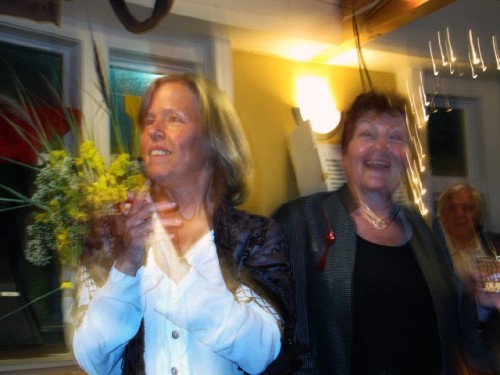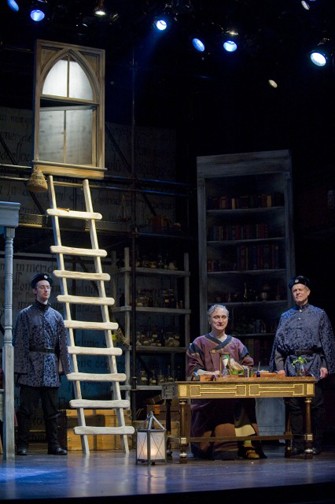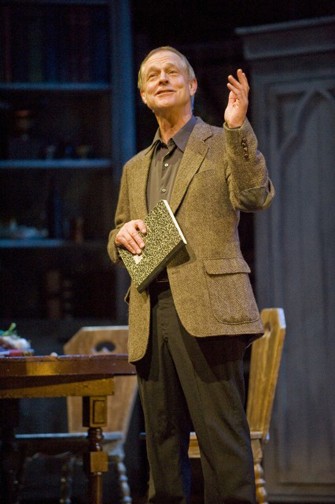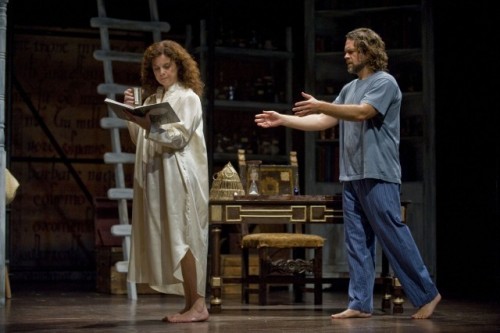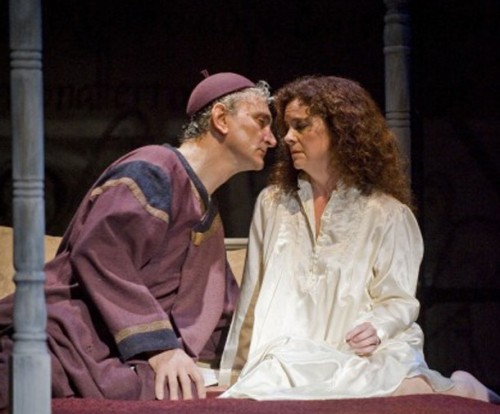The Taster by Joan Ackermann
Premiere at Shakespeare & Company
By: Charles Giuliano - Aug 07, 2010
The Taster
By Joan Ackerman
Directed by Tina Packer
Set, Yoshi Tanokura; Costumes, Govane Lohbauer; Lighting, Christopher Thielking; Composer and sound design, Scott Killian; Production house manager, Hope Rose Kelly.
Cast: Rocco Sisto (Octavio Pillars/ Syd), Maureen O’Flynn (Queen Mariana/ Claudia), Robert Biggs (Esteban/ Bernard), Zachary Krohn (Guillaume), Tom O’Keene (King Gregorio/ Henry).
Shakespeare & Company
July 29 to September 4, 2010
Bounding on stage before the premiere of the Joan Ackerman play The Taster the artistic director of Shakespeare & Company, Tony Simotes, with a hoarse voice from recent throat therapy, announced some very good news.
When he took over last year he inherited from founder, Tina Packer, who has directed the new play, a financially strapped company. For starters we was faced with raising the final phase of $1.2 million in order to qualify for an $800,000 challenge grant to complete a $10 million capital campaign.
There was a fund raising dinner before the opening of the play and he informed the VIP audience that they have just received the Kresge Foundation grant. In reaching the goal during the past year some 900 new donors came forward. Simotes, who is struggling to regain his health and stamina, quipped that “I will personally be meeting each and every one of you.”
So it was a festive and celebratory evening for a company that appears to be on track to dig itself out of a big financial hole. Just a year ago the situation was grim.
Another reason to celebrate is that S&Co is able to do its good work. That means both sustaining the artistic legacy of Shakespeare as well as producing contemporary plays and even commissioning new works. In this case enlisting the Berkshire based Joan Ackermann. Her Off the Map has won acclaim not only on stage, but also as a film directed by Campbell Scott. The movie which starred Joan Allen and Sam Elliott, was screened in competition at the 2003 Sundance Film Festival, and then received a limited release around the country in 2004.
This production was sponsored by Dr. Donald and Phoebe Giddon.
What is particularly unique about The Taster is that it was written with specific S&Co players in mind. The key to the project is Rocco Sisto who, like all five actors in the production, plays a dual role as both The Taster (Octavio Pillars) as well as a nutritionist, Syd. With a career in opera Maureen O’Flynn (Queen Mariana/ Claudia) is returning to the stage. One of her two roles is that of an opera singer which allows for her to sing an aria.
With such specific casting one wonders how future productions will deal with this. Surely it will not be easy to find a woman combining skills as a singer and actor. And, truly, how could anyone hope to fill the shoes of Sisto, whose commanding presence in this production, overpowers the other performers.
Ackerman has written a multi layered play which has been set in motion by the effective but complex set designed by Yoshi Tanokura. It has taken S&Co’s bare pipe approach to a new level. Literally. It even entails a ladder by which The Taster is able to climb up and look through a window onto the action in the couryard below. There he observes the Queen who passes by singing when she is happy and silent when not.
In directing this play Packer has activated her cast with peripatetic activity. They charge about the set in perpetual, blurry commotion. It keeps us visually involved through the complex multi layered plot which catapults back and forth from past to present. It entails a narrator (Robert Biggs) at the beginning and end of the dramatic trajectory. There are moments when centuries collide as the actors share scenes and sense each other as spectral presences and shades of the past.
At times it is difficult to sort out all of the layering and to find the thread of continuity which stitches together the disparate elements. It is here that Sisto is key. His towering, stately physicality and nuanced performance grounds the play during passages where that multi-valence tends to the centrifugal. During the evening the plot expands and contracts, implodes and explodes. Not always with the best result.
The depressed Henry(Tom O"Keefe) has been fired by Merrill Lynch. He is moping about the house laboring in the dank basement on the translation of a centuries old play in an ancient Basque language. Over the years the play was translated and upgraded. The narrator will inform us at the end of the play, when the actors freeze, that there are several possible endings depending on which translation one follows. These range from happily ever after to tragic. We may well anticipate “The Director’s Cut.”
It seems that at Harvard Henry majored in linguistics not economics. He is returning to his first love. But this project at translating an ancient play is greeted with contempt by his wife Claudia who has been the primary bread winner while he mopes about. She is spending all of her time away from home and the meek Henry asks if she is having an affair. He asks “Tell me yes or no.” She answers with contempt “yes or no.”
Claudia does not dignify him with a response as she is off to another rehearsal. Sarcastically she inquires whether there is a large commercial audience for an ancient Basque play. Apparently not. But then again. Even she finds there is merit in the effort as she starts to read his translation. Henry’s former professor ( Biggs) is impressed stating that “The student as surpassed the master.”
The ancient play relates the saga of the King’s Taster. Three times a day, with great ceremony, he puts on special robes (nicely designed by Govane Lohbauer) to preside over what is to be served to the king.
The tray is delivered by two servants with the appropriate bows. They stand mute as he goes about his elaborate business. It entails a magnifying glass, treatment with tinctures to reveal chemical ingredients, smell, touch, and finally taste. When he eats a sample he turns an hour glass and holds a finger to the pulse on his neck. If he survives (others have not) he sets his seal to a document and the food is deemed safe and fit for a king.
Although there is risk involved the taster gets to sample state of the art cuisine from the royal chefs. It is the curious perk of service to the King. As his job he has the finest taste buds and palate in the realm. He is a master of the gustatory. In that aspect an artist of the greatest accomplishment. Compared to which the King, especially as over played by O’Keefe, is a dolt, bully and fool.
Ackermann’s play conveys a lot about the difference between tasting, savoring the food with its exotic, erotic flavors and ingredients, and eating. For the most part Americans just eat. We consume massive amounts of meat and fried food, to fill the stomach and clog the intestines. While Europeans dine. Except the British of course, who are the ancestors of Anglo Saxon America, and are entirely ignorant of the refinements of dining. Unless they import European chefs whom they regard as foreigners. Hogarth painted a paean to British Roast Beef and the Royal Guards are known as the Beef Eaters. The Brits brew beer while the French cultivate wine. Much as I like me pint in the pub with bangers and mashed.
We encountered this cultural difference last fall during three weeks in Provence. Those amazing working class lunches in bistros in villages along the road. Compared to the American lunch of soup and salad on the run the French locals show up and linger over a noonday meal. They drink wine compared to our diet Coke. Or a “gourmet” cup of Joe at Starbucks. Make that a latte.
Ackerman’s play is a bit of a preachy lesson to the vulgarians in the Berkshires. Though most in the audience can afford the forty dollar entrees in pretentious Lenox restaurants.
We prefer to dine at home with fresh local ingredients from farm stands. Like those nice yellow tomatoes I paid $1.75 each for on the way to the theatre. We will enjoy them with fresh mozzarella, basil pinched from the pot on the deck, a drizzle of extra virgin olive oil, with a splash of fresh squeezed lemon. Fresh corn picked from the fields just hours before serving.
It’s all in the seasons as the Taster rhapsodizes. His favorite month is September when all of the produce comes to harvest. During our September in Provence the streets of the village of Paraza, where we walked each day, smelled of the rotten grapes being harvested and crushed for wine. I have a case of Chateau de Paraza languishing forgotten for a decade to be opened on my 80th birthday. It will bring back all of those accents and memories of Provence.
But the bellowing and boisterous king is fixated on October. It is when his son is born. Here the king is way over the top bouncing about the room of the taster jumping up and down clapping his hands in a goody goody mantra. Please, spare me the regal histrionics. Tina, my goodness girl, a bit of restraint. He is going to name his heir Octavio after his friend, his only friend, the taster.
The Taster suggests Augustus, far more regal. And several other possibilities. Anything but Octavio.
This is a bit of a sticky wicket because it seems that the King’s buddy boffed the Queen. She was condemned to death for not bearing an heir. The Queen prevails upon him to have this ultimate taste of the Kings private stock. The Taster took one for the team thereby saving her majesty from the scaffold. Nice guy that Taster. So obliging to the royals.
And so the plot goes twisting and cavorting about to one of its several possible conclusions. Judging from audience reaction a good time was had by all. Now for a home grown peach. So ripe and juicy.


